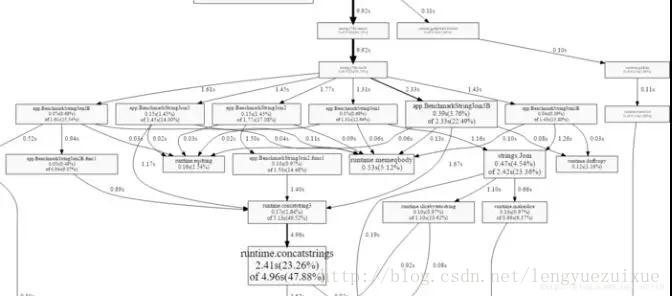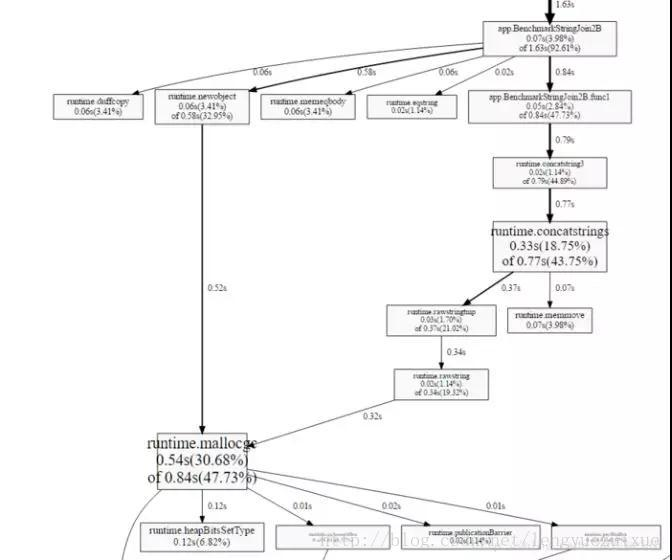写性能测试在Go语言中是很便捷的,go自带的标准工具链就有完善的支持,下面我们来从Go的内部和系统调用方面来详细剖析一下Benchmark这块。
Benchmark
Go做Benchmark只要在目录下创建一个_test.go后缀的文件,然后添加下面函数:
func BenchmarkStringJoin1(b *testing.B) {b.ReportAllocs()input := []string{"Hello", "World"}for i := 0; i < b.N; i++ {result := strings.Join(input, " ")if result != "Hello World" {b.Error("Unexpected result: " + result)}}}
调用以下命令:
# go test -run=xxx -bench=. -benchtime="3s" -cpuprofile profile_cpu.out
该命令会跳过单元测试,执行所有benchmark,同时生产一个cup性能描述文件。
注意
·-benchtime 可以控制benchmark的运行时间
·b.ReportAllocs(),在report中包含内存分配信息,例如结果是:
BenchmarkStringJoin1-4 300000 4351 ns/op 32 B/op 2 allocs/op
-4表示4个CPU线程执行,3000000表示总共执行了30万次;4531ns/op,表示每此执行耗时4531纳秒;32B/op表示每次执行分配了32字节内存;2allocs/op表示每次执行分配了2次对象。
根据上面的信息,我们就能对热点路径进行内存对象分配的优化,例如针对上面的程序我们可以小小的优化:
func BenchmarkStringJoin2(b *testing.B) {b.ReportAllocs()input := []string{"Hello", "World"}join := func(strs []string, delim string) string {if len(strs) == 2 {return strs[0] + delim + strs[1];}return "";};for i := 0; i < b.N; i++ {result := join(input, " ")if result != "Hello World" {b.Error("Unexpected result: " + result)}}}
新的Benchmark结果是:
BenchmarkStringJoin2-4 500000 2440 ns/op 16 B/op 1 allocs/op
可以看出来,在减少了内存分配后,性能提升了60%以上!
Cpu Profile
Cpu profile是Go语言工具链中最闪耀的部分之一,掌握了它以及memory、block profile, 那基本上就没有你发现不了的性能瓶颈了。
之前的benchmark同时还生产了一个profile_cpu.out文件,这里我们执行下面的命令:
# go tool pprof app.test profile_cpu.outEntering interactive mode (type "help" for commands)(pprof) top108220ms of 10360ms total (79.34%)Dropped 63 nodes (cum <= 51.80ms)Showing top 10 nodes out of 54 (cum >= 160ms)flat flat% sum% cum cum%2410ms 23.26% 23.26% 4960ms 47.88% runtime.concatstrings2180ms 21.04% 44.31% 2680ms 25.87% runtime.mallocgc1200ms 11.58% 55.89% 1200ms 11.58% runtime.memmove530ms 5.12% 61.00% 530ms 5.12% runtime.memeqbody530ms 5.12% 66.12% 2540ms 24.52% runtime.rawstringtmp470ms 4.54% 70.66% 2420ms 23.36% strings.Join390ms 3.76% 74.42% 2330ms 22.49% app.BenchmarkStringJoin3B180ms 1.74% 76.16% 1970ms 19.02% runtime.rawstring170ms 1.64% 77.80% 5130ms 49.52% runtime.concatstring3160ms 1.54% 79.34% 160ms 1.54% runtime.eqstring
上面仅仅展示部分函数的信息,并没有调用链路的性能分析,如果需要完整信息,我们要生产svg或pdf图。
# go tool pprof -svg profile_cpu.out > profile_cpu.svg# go tool pprof -pdf profile_cpu.out > profile_cpu.pdf
下面是profile_cpu.pdf的图:
可以看到图里包含了多个benchmark的合集,但我们只关心性能最差的那个benchmark,因此需要过滤:
go test -run=xxx -bench=BenchmarkStringJoin2B$ -cpuprofile profile_2b.outgo test -run=xxx -bench=BenchmarkStringJoin2$ -cpuprofile profile_2.outgo tool pprof -svg profile_2b.out > profile_2b.svggo tool pprof -svg profile_2.out > profile_2.svg

根据图片展示,benchmark自身的函数runtime.concatstrings触发了内存对象的分配,造成了耗时,但是跟踪到这里,我们已经无法继续下去了,因此下面就需要flame graphs了。
如果想详细查看,你主要点击这些矩形块就好了。
生产这些图,我们需要uber/go-torch这个库,这个库使用了https://github.com/brendangregg/FlameGraph,下面是一个自动下载依赖,然后生成frame graph的脚本,读者可以根据需要,自己实现。
#!/bin/bash# install flamegraph scriptsif [ ! -d "/opt/flamegraph" ]; thenecho "Installing flamegraph (git clone)"git clone --depth=1 https://github.com/brendangregg/FlameGraph.git /opt/flamegraphfi# install go-torch using dockerif [ ! -f "bin/go-torch" ]; thenecho "Installing go-torch via docker"docker run --net=party --rm=true -it -v $(pwd)/bin:/go/bin golang go get github.com/uber/go-torch# or if you have go installed locally: go get github.com/uber/go-torchfiPATH="$PATH:/opt/flamegraph"bin/go-torch -b profile_cpu.out -f profile_cpu.torch.svg
至此,我们的benchmark之路就告一段落,但是上面所述的cpu profile不仅仅能在benchmark中,还能直接在线debug生产环境的应用性能。
完整源码
package mainimport "testing"import "strings"func BenchmarkStringJoin1(b *testing.B) {b.ReportAllocs()input := []string{"Hello", "World"}for i := 0; i < b.N; i++ {result := strings.Join(input, " ")if result != "Hello World" {b.Error("Unexpected result: " + result)}}}func BenchmarkStringJoin1B(b *testing.B) {b.ReportAllocs()for i := 0; i < b.N; i++ {input := []string{"Hello", "World"}result := strings.Join(input, " ")if result != "Hello World" {b.Error("Unexpected result: " + result)}}}func BenchmarkStringJoin2(b *testing.B) {b.ReportAllocs()input := []string{"Hello", "World"}join := func(strs []string, delim string) string {if len(strs) == 2 {return strs[0] + delim + strs[1];}return "";};for i := 0; i < b.N; i++ {result := join(input, " ")if result != "Hello World" {b.Error("Unexpected result: " + result)}}}func BenchmarkStringJoin2B(b *testing.B) {b.ReportAllocs()join := func(strs []string, delim string) string {if len(strs) == 2 {return strs[0] + delim + strs[1];}return "";};for i := 0; i < b.N; i++ {input := []string{"Hello", "World"}result := join(input, " ")if result != "Hello World" {b.Error("Unexpected result: " + result)}}}func BenchmarkStringJoin3(b *testing.B) {b.ReportAllocs()input := []string{"Hello", "World"}for i := 0; i < b.N; i++ {result := input[0] + " " + input[1];if result != "Hello World" {b.Error("Unexpected result: " + result)}}}func BenchmarkStringJoin3B(b *testing.B) {b.ReportAllocs()for i := 0; i < b.N; i++ {input := []string{"Hello", "World"}result := input[0] + " " + input[1];if result != "Hello World" {b.Error("Unexpected result: " + result)}}}


